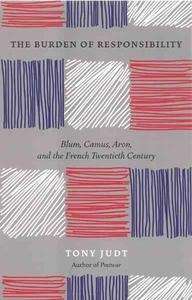The Burden of Responsibility
Blum, Camus, Aron and the French Twentieth Century

Editorial University Of Chicago Press
Fecha de edición febrero 2007
Idioma inglés
EAN 9780226414195
196 páginas
Libro
encuadernado en tapa blanda
Resumen del libro
Using the lives of the three outstanding French intellectuals of the 20th century, renowned historian Tony Judt offers a unique look at how intellectuals can ignore political pressures and demonstrate a heroic commitment to personal integrity and moral responsibility unfettered by the difficult political exigencies of their time.Leon Blum, Albert Camus, and Raymond Aron might seem an unlikely combination. Blum was a fin-de-siecle aesthete who became the spiritual and political leader of the French non-Communist Left in the first half of this century. Camus, best known to millions of readers worldwide for his novels "The Stranger" and "The Plague," was a wartime Resistance figure who played a prominent part in post-1945 intellectual life in France before dying tragically young in a car crash in 1960. Aron, a contemporary of Jean-Paul Sartre in the brilliant intellectual generation of interwar France, was a political theorist, journalist, and critic of Communism who made a major contribution to the recent revival of liberal thought in contemporary France. In "The Burden of Responsibility," Tony Judt offers a distinctive and original reinterpretation of the writings and public role of these three men, arguing that they have much in common. Despite the great differences in their backgrounds, their interests, and their views, all three were men of integrity who took seriously their responsibility as public intellectuals.
Biografía del autor
x{0026}lt;P x{0026}lt;B Tony Judt x{0026}lt;/B (Londres, 1948-Nueva York, 2010) realizó sus estudios en el King's College de Cambridge y en la École Normale Supérieure de París. Impartió clases en las universidades de Cambridge, Oxford, Berkeley y Nueva York, y en esta última ocupó la cátedra de Estudios Europeos, que él mismo fundó en 1995, y fue director del Remarque Institute. Entre sus publicaciones cabe destacar x{0026}lt;I El peso de la responsabilidadx{0026}lt;/I (Taurus, 2014), x{0026}lt;I ¿Una gran ilusión?x{0026}lt;/I (Taurus, 2013), x{0026}lt;I Pensar el siglo XXx{0026}lt;/I (Taurus, 2012), x{0026}lt;I El refugio de la memoriax{0026}lt;/I (Taurus, 2011), x{0026}lt;I Algo va malx{0026}lt;/I (Taurus, 2010), x{0026}lt;I Sobre el olvidado siglo XX x{0026}lt;/I (Taurus, 2008), x{0026}lt;I Pasado imperfectox{0026}lt;/I (Taurus, 2007), x{0026}lt;I Postguerrax{0026}lt;/I (Taurus, 2006), considerado uno de los diez mejores libros de 2005 por la x{0026}lt;I New York Times Book Reviewx{0026}lt;/I , galardonado con el Premio Council on Foreign Relations Arthur Ross y finalista del premio Pulitzer, y x{0026}lt;I Cuando los hechos cambianx{0026}lt;/I (Taurus, 2015). Judt colaboró en diferentes medios de Europa y Estados Unidos, como x{0026}lt;I The New York Review of Booksx{0026}lt;/I , el x{0026}lt;I Times Literary Supplementx{0026}lt;/I o x{0026}lt;I The New York Timesx{0026}lt;/I . En 2007 recibió el Premio Hannah Arendt, y en 2009 el Orwell Prize for Lifetime Achievement. Falleció en agosto de 2010 a causa de una enfermedad degenerativa.x{0026}lt;/P








